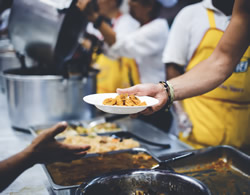Killian Plastow* says Australian charities are under “severe stress and strain” due to the coronavirus pandemic.
 Australians are among the most generous people in the world, but the nation’s charitable sector faces immense pressure from three coronavirus-linked challenges.
Australians are among the most generous people in the world, but the nation’s charitable sector faces immense pressure from three coronavirus-linked challenges.
Charities are preparing for a surge in demand as the mental and financial toll of the pandemic begins to weigh on Australians.
But at the same time, donations and volunteer numbers are dwindling as struggling households understandably put their own needs first – leaving one in seven organisations at risk of collapse.
Research from the Charities Aid Foundation shows close to 70 per cent of Australian adults donate money to charity and more than a third (35 per cent) volunteer in some capacity.
Globally, the nation is considered the second-most generous nation behind Indonesia.
But the outbreak of COVID-19 is posing a severe threat to Australia’s charitable sector, with modelling by wealth manager JB Were forecasting a 7.1 per cent fall in donations in 2020, followed by an 11.9 per cent drop in 2021.
The sharp declines will take Australia’s total annual charitable donations back to the same level recorded in 2012.
Charities in need of help
The pain is already being felt by many organisations – including Legacy, a charity providing support and services to the families of defence force personnel.
Speaking to The New Daily, Legacy head of fundraising Joanne Watson said the organisation’s major annual event, Legacy Week, only raised 20 per cent of the funds taken in a normal year.
“We’ve fundraised on the street as part of Legacy Week for over 75 years – it’s our major fundraiser,” she said.
“But we’ve received nothing, just like everyone else. All our events have been cancelled the whole way through this crisis.”
At the same time, requests for assistance have skyrocketed.
Legacy caseworkers have seen a 17 per cent increase in calls for assistance in Melbourne alone, with many relating to post-traumatic stress disorder (PTSD) or domestic violence.
Ms Watson said Legacy has no intention to cut back its community services.
But the organisation has been forced to cut other costs – standing down staff and cancelling social events such as children’s camps and long-running gatherings for war widows.
Ms Watson believes it will take years for the situation to return to normal, but she hopes Australians will give what they can.
“It’s about mateship, and looking after the people beside you,” she said.
“And the people you help today, could end up looking after you tomorrow.”
‘Severe stress and strain’
Philanthropy Australia policy and research director Sarah Wickham said returning to pre-COVID donation levels would be time-consuming for some and unachievable for others.
Modelling by Social Ventures Australia and the Centre for Social Impact shows one in seven (14 per cent) Australian charities are at risk of collapse by September 2021, and close to half (44 per cent) are on track to make an operating loss by that point.
The same modelling found that roughly 170,000 charity workers could lose their jobs as a result.
“There’s going to be severe stress and strain on a lot of the programs and everyday services that charities provide,” Ms Wickham said.
And charities will have to do more with less, as volunteer numbers are dwindling.
In normal times, Australia has “just a smidge under six million” formal and informal volunteers, according to Volunteering Australia CEO Mark Pearce.
These volunteers make up a clear majority of charity workers, and roughly 60 per cent of charities could not operate without them.
But coronavirus shutdowns reduced that labour pool by 65.9 per cent between February and April.
On top of this, older Australians (aged 65 to 74) who face the biggest risk from COVID-19 also represent about a third of Australian volunteers.
Mr Pearce said many will be unable or unwilling to resume their frontline volunteer duties after the pandemic.
Opportunity for government to rebuild sector
Ms Wickham and Mr Pearce said the federal government has so far been receptive to concerns raised by the charity sector.
But they said more can be done to bridge the shortfalls in donations and volunteers.
For example, the federal government could increase donation tax deductions from 100 per cent to 120-150 per cent this financial year; improve charities’ access to government loan schemes; and formally recognise on-the-job training given to volunteers.
“If we don’t continue to see Australians donating during this time, the responsibility will fall back to the government to make that back,” Ms Wickham said.
*Killian Plastow is a contributor at the New Daily
This article first appeared at thenewdaily.com



